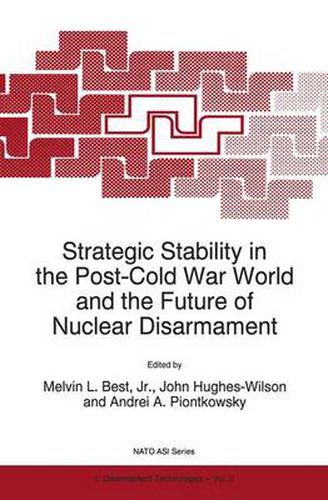Readings Newsletter
Become a Readings Member to make your shopping experience even easier.
Sign in or sign up for free!
You’re not far away from qualifying for FREE standard shipping within Australia
You’ve qualified for FREE standard shipping within Australia
The cart is loading…






This title is printed to order. This book may have been self-published. If so, we cannot guarantee the quality of the content. In the main most books will have gone through the editing process however some may not. We therefore suggest that you be aware of this before ordering this book. If in doubt check either the author or publisher’s details as we are unable to accept any returns unless they are faulty. Please contact us if you have any questions.
The contributors to Strategic Stability in the Post-Cold War World and the Future of Nuclear Disarmament recognize that the collapse of the former Soviet Union has left a conceptual vacuum in the definition of a new world order. Never before have the components of world order all changed so rapidly, so deeply, or so globally. As Henry Kissinger points out, the emergence of a new world order will have to confront three fundamental questions: What are the basic units of the international order? What are their means of interacting? and What are the goals on behalf of which they interact? The main question is whether the establishment and maintenance of an international system will turn out to be a conscious design, or the outgrowth of a trial of strength. The concept of a planning framework that could shape or govern these interactions is emerging and may now be at hand. Capturing this emerging framework is the thrust of the present book, which seeks to reach a consensus on defining a model (calculus) for strategic stability in a changing, multipolar world in the presence of weapons of mass destruction - the model being the core of a conscious design to shape or govern the interactions of nation states in a new world order. The following taxonomy of the dimensions of strategic stability was accepted by the contributors as the first step towards such a model: Stability in geopolitics and balance of power; Arms race stability; Deterrence stability, crisis stability, first strike stability; Stability in the presence of clandestine proliferation. After four gruelling days, this unprecedented gathering of top academic, scientific and military experts from the USA, Russia, the UK, France, China, India, and Israel reached a general agreement that is captured in the Consensus Report; each participant presented an individual contribution that further fleshes out the dimensions of strategic stability. This unprecedented work provides joint concepts for all leaders of the nuclear powers to shape their decisions for the coming decades. And for the first time they can base their decisions on agreed scientific facts, not just political judgments.
$9.00 standard shipping within Australia
FREE standard shipping within Australia for orders over $100.00
Express & International shipping calculated at checkout
This title is printed to order. This book may have been self-published. If so, we cannot guarantee the quality of the content. In the main most books will have gone through the editing process however some may not. We therefore suggest that you be aware of this before ordering this book. If in doubt check either the author or publisher’s details as we are unable to accept any returns unless they are faulty. Please contact us if you have any questions.
The contributors to Strategic Stability in the Post-Cold War World and the Future of Nuclear Disarmament recognize that the collapse of the former Soviet Union has left a conceptual vacuum in the definition of a new world order. Never before have the components of world order all changed so rapidly, so deeply, or so globally. As Henry Kissinger points out, the emergence of a new world order will have to confront three fundamental questions: What are the basic units of the international order? What are their means of interacting? and What are the goals on behalf of which they interact? The main question is whether the establishment and maintenance of an international system will turn out to be a conscious design, or the outgrowth of a trial of strength. The concept of a planning framework that could shape or govern these interactions is emerging and may now be at hand. Capturing this emerging framework is the thrust of the present book, which seeks to reach a consensus on defining a model (calculus) for strategic stability in a changing, multipolar world in the presence of weapons of mass destruction - the model being the core of a conscious design to shape or govern the interactions of nation states in a new world order. The following taxonomy of the dimensions of strategic stability was accepted by the contributors as the first step towards such a model: Stability in geopolitics and balance of power; Arms race stability; Deterrence stability, crisis stability, first strike stability; Stability in the presence of clandestine proliferation. After four gruelling days, this unprecedented gathering of top academic, scientific and military experts from the USA, Russia, the UK, France, China, India, and Israel reached a general agreement that is captured in the Consensus Report; each participant presented an individual contribution that further fleshes out the dimensions of strategic stability. This unprecedented work provides joint concepts for all leaders of the nuclear powers to shape their decisions for the coming decades. And for the first time they can base their decisions on agreed scientific facts, not just political judgments.